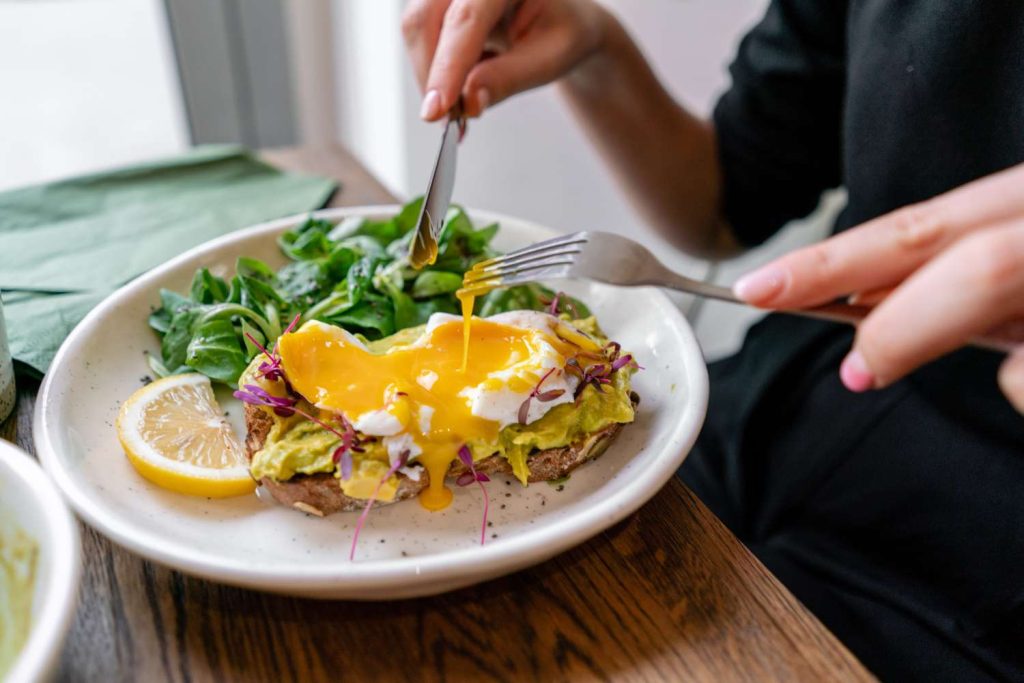B vitamins are essential for many bodily functions, including turning food into energy and creating red blood cells. Key B vitamins include thiamine (B1), riboflavin (B2), niacin (B3), folic acid (B9), and cobalamin (B12).
You can find B vitamins in unprocessed foods such as meat, eggs, leafy green vegetables (e.g., kale, spinach, romaine lettuce), citrus fruits, and more. You can also get them through supplements. However, it’s better to get these nutrients from food sources.
1. Meat, Poultry, Fish
- Red meat contains thiamine, niacin, and pyridoxine (B6). A T-bone steak contains the recommended daily amount of vitamin B12. Vitamin B12 helps keep your body’s blood and nerve cells healthy.
- Poultry, like chicken and turkey, is also loaded with B vitamins, including vitamins B1, B3, B6, and riboflavin (B2). Vitamin B6 is found more in chicken or turkey breasts. It helps your immune and nervous systems function properly and plays a role in metabolism.
- Fatty fish, like salmon, contain high amounts of vitamins B12, B3, B6, and B2. Salmon is also high in omega-3 fatty acids, which may promote brain health. One study found adding a salmon protein supplement to a person’s diet for eight weeks increased their serum vitamin B12 concentrations.
2. Liver
Liver and other organ meats are a great source of B vitamins. Liver is a good source of pantothenic acid (B5) and folate. Pantothenic acid helps your body release energy from food, while folate helps make red blood cells. You can consume liver from beef, chicken, lamb, or pork. If you are pregnant, you may have to avoid eating liver.
3. Eggs
Eggs contain several B vitamins, including B12 and B2. Two large eggs provide about 46% of your daily value (DV), meaning the recommended amount of nutrients to get or not to exceed each day, of B12 and 39% of your DV of B2. Riboflavin keeps your skin, eyes, and nervous system healthy. It also helps your body release energy from the foods you eat.
Egg yolks also contain a good amount of biotin (B7), which helps your body make fatty acids and helps the body break down carbohydrates, fats, and proteins to use as energy.
4. Legumes
Legumes are a family of foods that includes beans, peas, and lentils. They are a good source of B vitamins, especially folate. A half cup of green soybeans (edamame) provides 60% of your DV of folate. Lentils are also high in protein and fiber. They are a good food choice for people following a plant-based diet.
5. Leafy Greens
Dark green leafy vegetables are chock full of vitamins and nutrients, including B vitamins. They contain an especially high amount of folate. Some examples of leafy greens include spinach, kale, and collards. A half cup of cooked spinach contains about 39% of your daily value of folate.
6. Avocados
Avocados contain many B vitamins, including B2, B6, and B5. They are also rich in biotin. Additionally, avocados contain healthy fats, which may keep you feeling full longer. You can eat an avocado or try adding it to bowls or salads. Guacamole is also a popular dip that contains avocados.
7. Whole Grains
Eating whole grains can boost vitamin B. Whole-grain bread is a good source of thiamine. This vitamin helps keep your nervous system healthy and aids your body in breaking down and releasing energy from food. Oats, brown rice, and pasta are other whole grains that contain B vitamins.
8. Fortified Breakfast Cereals
Fortified breakfast cereals have different types of vitamin B added to them. Many include folic acid and vitamins B12, B1, B2, B5, and B6. While these cereals contain several nutrients, they also typically have a high sugar content. It’s a good idea to check the label to ensure the product does not contain excessive amounts of sugar.
9. Milk
Milk contains a variety of B vitamins. Just 1 cup provides about 26% of your daily value of riboflavin. Milk is also rich in calcium and vitamin D, which can help promote strong bones.
10. Citrus Fruits
Not only are citrus fruits like oranges, lemons, limes, and tangerines high in vitamin C, but they are also a good source of vitamin B6. Studies suggest B6 may reduce the risk of heart disease.
11. Oysters, Clams, and Mussels
Oysters, clams, and mussels are good foods to increase vitamin B intake. They contain lots of cobalamin and riboflavin. They provide smaller amounts of niacin, thiamine, and folate. These shellfish are also high in minerals, such as selenium, zinc, and manganese. And they are a good source of fatty acids.
12. Yogurt
Yogurt is another dairy product containing B12 and B2. Be sure to check the labels, as many nondairy yogurt alternatives don’t provide as many B vitamins as those made with dairy. You can enjoy plain yogurt on its own or add it to a smoothie or fruit bowl.
13. Sunflower Seeds
Sunflower seeds are good sources of B5 and B7. These tiny seeds also boast fiber, unsaturated fat, and protein. You can sprinkle sunflower seeds on your favorite dish or dessert. Or consume them right out of the package.
A Word From Verywell
Getting enough vitamin B is easy, even for those following a plant-based diet. Simply incorporate more whole, minimally processed foods into your meals. Nutrient-rich options like leafy greens, beans and legumes, nuts, seeds, and whole grains are delicious and natural sources of vitamin B.
:max_bytes(150000):strip_icc()/ElizabethBarnes-946a8fc150704967bf7a21a40752d034.png)
Summary
B vitamins are important for helping your body turn food into energy and making red blood cells. B vitamins include B2, B12, and B9. The best way to get these vitamins is through food.
Generally, a well-balanced diet with many whole foods will give you all the B vitamins you need. Foods with B vitamins include eggs, meat, avocados, liver, citrus fruits, whole grains, leafy greens, fortified breakfast cereal, and more.








